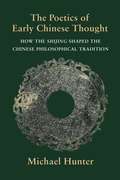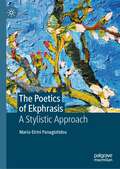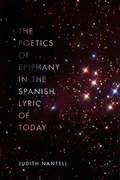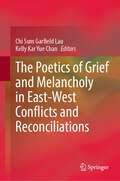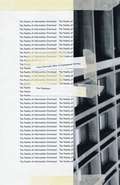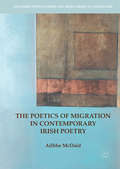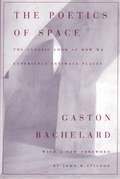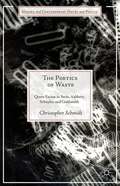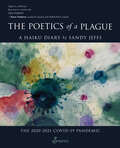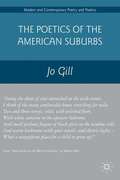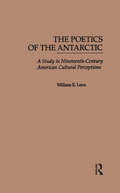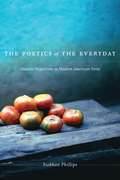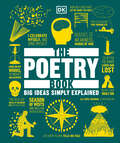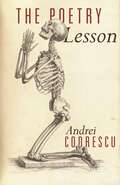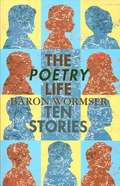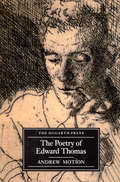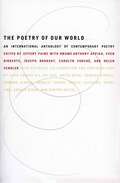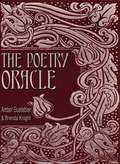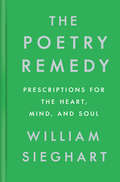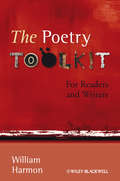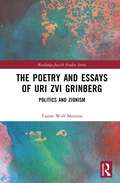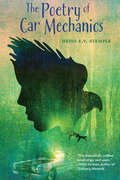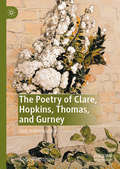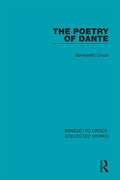- Table View
- List View
The Poetics of Early Chinese Thought: How the Shijing Shaped the Chinese Philosophical Tradition
by Michael HunterThe modern imagination of classical Chinese thought has long been dominated by Confucius, Mozi, Mencius, and other so-called “Masters” of the Warring States period. Michael Hunter argues that this approach neglects the far more central role of poetry, and the Shijing (Classic of Poetry) in particular, in the formation of the philosophical tradition. Through a new reading of its ideology and poetics, Hunter reestablishes the Shijing as a work of major intellectual-historical significance. The Poetics of Early Chinese Thought demonstrates how Shi poetry weaves a vision of society united at every level by the innate and universal impulse to come home. The Shi immersed early thinkers in a world of movement and flow in order to teach them that the most powerful current of all was the gravitational pull of a virtuous king, without whom people can never truly feel at home. Hunter traces the profound influence of the Shi ideology across numerous sources of classical Chinese thought, which he recasts as a network centered on the Shi. Reframing the tradition in this way reveals how poetry shaped ancient Chinese thinkers’ conception of the world and their place within it.This book offers both a sweeping critique of how classical Chinese thought is commonly understood and a powerful new way of studying it.
The Poetics of Ekphrasis: A Stylistic Approach
by Maria-Eirini PanagiotidouThis book provides a stylistic and cognitive poetic account of ekphrastic poetry (poetry whose subject matter is predominantly artworks and images), examining the linguistic processes through which works of art can become literary objects. The author sheds light on the workings of ekphrasis at a textual level, while also considering the cognitive and psychological effects of reading ekphrastic poems, developing cognitive and stylistic analytical frameworks grounded on the four principles that govern ekphrasis: representation, narrativization, transposition, and collaboration. This book will be of interest to academics and practitioners in various fields, including literary critics, art critics, rhetoricians, poets, visual artists, and stylisticians.
The Poetics of Epiphany in the Spanish Lyric of Today
by Judith NantellDrawing on the poetry of four major voices in the Spanish lyric of today, Judith Nantell explores the epistemic works of Luis Muñoz, Abraham Gragera, Josep M. Rodríguez, and Ada Salas, arguing that, for them, the poem is the fundamental means of exploring the nature of both knowledge and poetry. In this first interpretive analysis of the epistemic nature of their poetry, Nantell innovatively engages these poets, each of whom has contributed one of their own poems along with a previously unpublished explication of their chosen poem. Each also provides an original biographical sketch to support Nantell’s development of a poetics of epiphany.
The Poetics of Grief and Melancholy in East-West Conflicts and Reconciliations
by Kelly Kar Yue Chan Chi Sum Garfield LauThis book is a collection of academic essays that examines the representation, esthetics and dichotomy of the notions of grief and melancholy in East–West exchanges and cultural dialogues. It explores the topic in the dimensions of individual behaviors under specific social norms and cultural products such as literature, film and any other forms of arts/genres, etc.In his 1917 work Mourning and Melancholia (Trauer und Melancholie), Sigmund Freud connected the grief of loss with melancholic emotions which may give rise to acts of mourning. He suggested that “[i]n mourning it is the world which has become poor and empty; in melancholia it is the ego itself” (Freud, 1917: 246). Inspired by Freud’s stance and with the goal of providing up-to-date intellectual resources for academics, researchers and students with ardent interests in the varying exemplifications of grief and melancholy in Sino-Western contexts, the book serves more than a discussion over the pragmatic and ritualistic connections of grief and melancholy in relation to the inner self and the external world. It aims at the pursuit of a contemporary theorization of grief and melancholy beyond its modern limits.
The Poetics of Information Overload: From Gertrude Stein to Conceptual Writing
by Paul StephensInformation overload is a subject of vital, ubiquitous concern in our time. The Poetics of Information Overload reveals a fascinating genealogy of information saturation through the literary lens of American modernism. Although technology has typically been viewed as hostile or foreign to poetry, Paul Stephens outlines a countertradition within twentieth- and twenty-first-century literature in which avant-garde poets are centrally involved with technologies of communication, data storage, and bureaucratic control. Beginning with Gertrude Stein and Bob Brown, Stephens explores how writers have been preoccupied with the effects of new media since the advent of modernism. He continues with the postwar writing of Charles Olson, John Cage, Bern Porter, Hannah Weiner, Bernadette Mayer, Lyn Hejinian, and Bruce Andrews, and concludes with a discussion of conceptual writing produced in the past decade.By reading these works in the context of information systems, Stephens shows how the poetry of the past century has had, as a primary focus, the role of data in human life.
The Poetics of Migration in Contemporary Irish Poetry
by Ailbhe McDaidThis book offers fresh critical interpretation of two of the central tenets of Irish culture - migration and memory. From its starting point with the 'New Irish' generation of poets in the United States during the 1980s and concluding with the technological innovations of 21st-century poetry, this study spans continents, generations, genders and sexualities to reconsider the role of memory and of migration in the work of a range of contemporary Irish poets. Combining sensitive close readings and textual analysis with thorough theoretical application, it sets out the formal, thematic, socio-cultural and literary contexts of migration as an essential aspect of Irish literature. This book is essential reading for literary critics, academics, cultural commentators and students with an interest in contemporary poetry, Irish studies, diaspora studies and memory studies.
The Poetics of Space
by Gaston Bachelard John R. StilgoeThirty years since its first publication in English, French philosopher Gaston Bachelard's The Poetics of Space one of the most appealing and lyrical explorations of home. Bachelard takes us on a journey, from cellar to attic, to show how our perceptions of houses and other shelters shape our thoughts, memories, and dreams.
The Poetics of Trespass
by Erik AndersonUsing his Denver apartment as a central locale, Erik Anderson walked a path that traced the letters Pastoral between February and March 2007. Navigating the various curves and corners of the city streets, Anderson charts the experiences of a writer in a man-made environment. Explorative, adventurous, and insightful, Anderson's meditations serve as a compelling social and aesthetic commentary.
The Poetics of Waste
by Christopher SchmidtModernist debates about waste - both aesthetic and economic - often express biases against gender and sexual errancy. The Poetics of Waste looks at writers and artists who resist this ideology and respond by developing an excessive poetics.
The Poetics of a Plague, A Haiku Diary: The 2020-2021 COVID-19 Lockdown
by Sandy JeffsWhat was it like to live in Melbourne during the 2020 2.0 lockdown? Capturing the day-to-day struggles of lockdown, the daily news, Dan Andrews' 11am morning press conferences, the tensions between Victorians and the rest of Australia, Trump's chaotic America, the conspiracy theories that circulated and battling her own mental health, Sandy Jeffs takes us through the whirlwind of events in imaginative haiku poems. These became her sanity while the world spiralled into madness. First wave fear is back. Before an end was in sight now there is no end. trying to make sense of an unravelling world that is downright mad. This is not only a book about the pandemic but also about political wins and political failures. From Dan Andrews to Donald Trump. Each day brings news that creates despair or joy: the pandemic numbers and the voting numbers side by side. And as the world is in the grip of COVID madness, sanity is found in poetry.
The Poetics of the American Suburbs
by Jo GillThe first scholarly study of the rich body of poetry that emerged from the post-war American suburbs, Gill evaluates the work of forty poets, including Anne Sexton, Langston Hughes, and John Updike. Combining textual analysis and archival research, this book offers a new perspective on the field of twentieth-century American literature.
The Poetics of the Antarctic: A Study in Nineteenth-Century American Cultural Perceptions (Studies In Nineteenth-century American Literature #Vol. 5)
by William E. LenzThe thesis of this book is that the 19th-century interest in the Antarctic functions for modern scholars as an important index to American self-discovery and self-definition from the 1830s onward. According to the author, American hopes for confirming identity came to be focused on an unlikely goal, the discovery of the illusive Antarctic continent. By examining in detail one literary product of the U.S. Exploring Expedition (1838-1842) to Antarctica, James Croxall Palmer's epic poem Thulia: A Tale of the Antarctic (1843), and its revision, The Antarctic Mariner's Song (1868), and by locating these works within their cultural context, Lenz reveals the significance and changing meaning of exploration to emerging American concepts of nationhood. The volume also considers the tradition of American sea fiction in the works of such writers as James Fenimore Cooper, Edgar Allan Poe, and Herman Melville, arguing that for these writers the Antarctic was a locus of symbolic meaning while for Palmer it was a process of individual and collective perception. The 1868 version of the Palmer poem is attached here as an appendix. A useful bibliography follows that appendix.
The Poetics of the Everyday: Creative Repetition in Modern American Verse
by Siobhan PhillipsWallace Stevens once described the "malady of the quotidian," lamenting the dull weight of everyday regimen. Yet he would later hail "that which is always beginning, over and over"-recognizing, if not celebrating, the possibility of fresh invention. Focusing on the poems of Wallace Stevens, Robert Frost, Elizabeth Bishop, and James Merrill, Siobhan Phillips positions everyday time as a vital category in modernist aesthetics, American literature, and poetic theory. She eloquently reveals how, through particular but related means, each of these poets converts the necessity of quotidian experience into an aesthetic and experiential opportunity. In Stevens, Phillips analyzes the implications of cyclic dualism. In Frost, she explains the theoretical depth of a habitual "middle way." In Bishop's work, she identifies the attempt to turn recurrent mornings into a "ceremony" rather than a sentence, and in Merrill, she shows how cosmic theories rely on daily habits. Phillips ultimately demonstrates that a poetics of everyday time contributes not only to a richer understanding of these four writers but also to descriptions of their era, estimations of their genre, and ongoing reconfigurations of the issues that literature reflects and illuminates.
The Poetry Book (DK Big Ideas)
by DKAn accessible guide to the most important poems ever written— from the Epic of Gilgamesh to The Waste Land—and the poets behind themDiscover the key themes and ideas behind the most important poems ever written, and the poetic geniuses who wrote them.The perfect introduction to poetry, The Poetry Book takes you on a fascinating journey through time to explore more than 90 of the world&’s greatest poetic works.Discover poems in all their many guises and from all over the world, from the epics of the ancient world through Japanese haikus and Renaissance sonnets to modernist masterpieces such as The Waste Land, and the key works of the last 50 years—from And Still I Rise by Maya Angelou to Derek Walcott&’s Omeros.Using the Big Ideas series' trademark combination of clear explanation, witty infographics, and inspirational quotes, The Poetry Book unlocks the key ideas, themes, imagery, and structural techniques behind even the most complex of poems, in clear and simple terms, setting each work in its historical, social, cultural, and literary context. Delve into the works of Dante, Baudelaire, Rimbaud, Dickinson, Eliot, and Neruda with in-depth literary analysis and fascinating biographies. Find out what odes, ballads, and allegories are. Trace recurring motifs, explore imagery, and find out how rhyme and rhythm work. From Beowulf to Seamus Heaney's Bogland, The Poetry Book is essential reading for readers of poetry and aspiring poets alike.
The Poetry Lesson
by Andrei CodrescuA rollicking story of the strangest creative writing class ever—as only Andrei Codrescu could tell it"Intro to Poetry Writing is always like this: a long labor, a breech birth, or, obversely, mining in the dark. You take healthy young Americans used to sunshine (aided sometimes by Xanax and Adderall), you blindfold them and lead them by the hand into a labyrinth made from bones. Then you tell them their assignment: 'Find the Grail. You have a New York minute to get it.' "—The Poetry LessonThe Poetry Lesson is a hilarious account of the first day of a creative writing course taught by a "typical fin-de-siècle salaried beatnik"—one with an antic imagination, an outsized personality and libido, and an endless store of entertaining literary anecdotes, reliable or otherwise. Neither a novel nor a memoir but mimicking aspects of each, The Poetry Lesson is pure Andrei Codrescu: irreverent, unconventional, brilliant, and always funny. Codrescu takes readers into the strange classroom and even stranger mind of a poet and English professor on the eve of retirement as he begins to teach his final semester of Intro to Poetry Writing. As he introduces his students to THE TOOLS OF POETRY (a list that includes a goatskin dream notebook, hypnosis, and cable TV) and THE TEN MUSES OF POETRY (mishearing, misunderstanding, mistranslating . . . ), and assigns each of them a tutelary "Ghost-Companion" poet, the teacher recalls wild tales from his coming of age as a poet in the 1960s and 1970s, even as he speculates about the lives and poetic and sexual potential of his twenty-first-century students. From arguing that Allen Ginsberg wasn't actually gay to telling about the time William Burroughs's funeral procession stopped at McDonald's, The Poetry Lesson is a thoroughly entertaining portrait of an inimitable poet, teacher, and storyteller.
The Poetry Of Edward Thomas
by Andrew MotionWhen Edward Thomas died at Arras in 1917 few people thought of him as a poet. Yet in the two years before his death, after a lifetime writing prose, Thomas wrote some of the most enduring poems of his day: poems of war, nature, friendship, despair and exultation. Andrew Motion's pioneering study of Thomas' life and achievement is scholarly yet utterly absorbing, combining an account of his struggles as a writer with perceptive readings of individual poems.Andrew Motion's books include a biography, The Lamberts, George, Constant and Kil, and several prize-winning collections of poetry, the most recent of which is Love in a Life. He is currently writing the authorized biography of Philip Larkin.
The Poetry Of Our World: An International Anthology Of Contemporary Poetry
by Ed J. PaineHere is a capacious and sparkling gathering of poems, an anthology that extends its reach from the English-speaking world to Asia, Africa, Europe, and Latin America. This unique volume includes such well-known figures as Pablo Neruda, Anna Akhmatova, Paul Celan, Seamus Heaney, Wole Soyinka, and Elizabeth Bishop but also offers the less familiar but equally welcome voices of Ugandan Okot p'Bitek, Indian A.K. Ramanujan, and the Japanese poet Shuntaro Tanikawa. With insightful essays by such eminent scholars and poets as Helen Vendler, Kwame Anthony Appiah, Sven Birkerts, Carolyn Forché, and Bei Dao placing the selections from each region in their cultural, political, and literary contexts, The Poetry of Our World guides readers through the richest and most eclectic selection of world poetry available today.
The Poetry Oracle
by Brenda Knight Amber GuetebierCombining poetry with divination, this collection resurrects the ancient Greek art of Rhapsodomancy, or divining one's fortune or destiny through the use of poetry or verse. Harkening back to antiquity, when Polyhymnia--the muse of sacred poetry--and Calliope--the muse of epic poetry--were invoked for guidance, each page of this anthology contains three poetic excerpts, chosen for their oracular wisdom. Readers are asked to contemplate a question and then randomly select an excerpt, which will offer revelations and inspiration for further contemplation. Excerpts are drawn from poets throughout the ages, including Sappho, Li Po, Rumi, Emily Dickinson, Walt Whitman, Dylan Thomas, William Blake, and J.R.R. Tolkien. Though designed as a prophetic tool, it can also be used as an introduction to some of the world's greatest poets.
The Poetry Remedy: Prescriptions for the Heart, Mind, and Soul
by William SieghartA beautiful collection of curated poems, individually selected to provide the perfect balm for every emotional need Sometimes only a poem will do. These poetic prescriptions and wise words of advice are tailored to those moments in life when we need them most, from general glumness to news overload, and from infatuation to losing the spark. Whatever you’re facing, there is a poem in these pages that will do the trick. This pocket-size companion presents the most essential fixes in William Sieghart’s poetic dispensary—those that, again and again, have shown themselves to hit the spot. Whether you are suffering from loneliness, lack of courage, heartbreak, hopelessness, or even an excess of ego—or whether you are seeking hope, comfort, inspiration, or excitement—The Poetry Remedy will provide just the poem you need in that moment.
The Poetry Toolkit: For Readers and Writers
by William HarmonThe Poetry Toolkit: For Readers and Writers provides students with the essential intellectual and practical tools necessary to read, understand, and write poetry. Explains the most important elements of poetry in clear language and an easily accessible manner Offers readers both the expertise of an established scholar and the insights of a practicing poet Draws on examples from more than 1,500 years of English literature
The Poetry and Essays of Uri Zvi Grinberg: Politics and Zionism (ISSN)
by Tamar Wolf-MonzonThis book focuses on the complex network of relationships between the poet Uri Zvi Grinberg and the Labor Movement in Mandate Palestine from 1923 to 1937.Making use of letters found in the Uri Zvi Grinberg Archive at the National Library of Israel (NLI), the author reconstructs the characteristics of Grinberg’s pioneer readership, attesting to their special relationship with his poetry. In the 1920s, it is argued, they considered Grinberg’s poetry an authentic expression of their complex spiritual world and especially of the reality of their lives. On his side, Grinberg accepted the pioneering ethos as the ideological basis of his works, becoming an outstanding poet of the Labor Movement. The chapters of this book track the various phases of Grinberg’s life and poetry, from his emigration to Palestine through to the 1930s, when he joined the Revisionist Movement and became increasingly ostracized from the Labor Movement. The story of Grinberg’s relations with the pioneers was emotionally charged—a mixture of enchantment and rejection, spiritual closeness and repulsion. Ultimately, this book analyzes the intensity of this connection and its many contradictory layers.This book will interest researchers in a range of fields, including Hebrew poetry and reception theory, as well as anyone interested in Israeli studies and the history of the Labor Movement in Palestine.
The Poetry of Car Mechanics
by Heidi E. Stemple&“This beautifully crafted novel sings and soars.&”—Nikki Grimes, author of Ordinary HazardsDylan seeks solace through birdwatching and poetry in the woods behind his grandfather&’s auto shop—but when he rescues an injured hawk, he must learn to confront the broken parts in himself in this powerful middle-grade novel-in-verse.15-year-old Dylan has always felt like an outsider in his small town. Isolated when he was younger as the result of his unpredictable, now absent mother and feeling like a disappointment to his grandfather who has stepped in to raise him, Dylan finds relief in the woods behind his grandfather's auto shop. Amidst the cool quiet of the trees, Dylan thrives on bird watching and writing poetry. But one afternoon after spotting an injured hawk, Dylan finds himself pushing out of his comfort zone to track down help for the bird—and ends up rescuing a part of himself in the process.In this luminous middle-grade novel-in-verse on navigating the lonely tumult of self-discovery amid complicated family history, Dylan relays his story with bracing emotional clarity.
The Poetry of Clare, Hopkins, Thomas, and Gurney: Lyric Individualism
by Andrew HodgsonThis book attends to four poets – John Clare, Gerard Manley Hopkins, Edward Thomas, and Ivor Gurney – whose poems are remarkable for their personal directness and distinctiveness. It shows how their writing conveys a potently individual quality of feeling, perception, and experience: each poet responds with unusual commitment to the Romantic idea of art as personal expression. The book looks closely at the vitality and intricacy of the poets’ language, the personal candour of their subject matter, and their sense, obdurate but persuasive, of their own strangeness. As it traces the tact and imagination with which each of the four writers realises the possibilities of individualism in lyric, it affirms the vibrancy of their contributions to nineteenth and twentieth-century poetry.
The Poetry of Dante (Collected Works #4)
by Benedetto CroceOriginally published in 1922 and partly from periodicals this book provides a methodological introduction to the reading of Dante’s The Divine Comedy, with the aim of removing the confusion surrounding much Dantean literature and helping the reader to focus attention on the essential qualities of Dante’s work.
